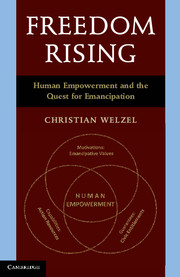Book contents
- Frontmatter
- Dedication
- Contents
- List of Tables
- List of Figures
- List of Boxes
- Abbreviations
- Preface
- Acknowledgment
- Introduction
- Part A Understanding Emancipative Values
- Part B Emancipative Values as a Civic Force
- Part C Democratic Impulses of Emancipative Values
- Part D Emancipative Values in Human Civilization
- Conclusion
- References
- Index
Conclusion
Published online by Cambridge University Press: 05 June 2014
- Frontmatter
- Dedication
- Contents
- List of Tables
- List of Figures
- List of Boxes
- Abbreviations
- Preface
- Acknowledgment
- Introduction
- Part A Understanding Emancipative Values
- Part B Emancipative Values as a Civic Force
- Part C Democratic Impulses of Emancipative Values
- Part D Emancipative Values in Human Civilization
- Conclusion
- References
- Index
Summary
Every human has four endowments – self awareness, conscience, independent will and creative imagination. These give us the ultimate human freedom. . . . The power to choose, to respond, to change.
– Stephen CoveyThe first section of this Conclusion summarizes the major insights of this book. Figure C.1 provides a synopsis. In the second section, I outline how these insights account for seven of the most fundamental facts about democracy. Section 3 discusses the links of the human empowerment framework to some related concepts of major importance, including existential security, the human need hierarchy, and social capital. Section 4 asks whether the key set of orientations that emerges with human empowerment – emancipative values – improves the moral stature of our species. The final section provides a condensed restatement of the theory of emancipation.
Key Insights
We have seen massive evidence for a multitude of trends toward human empowerment. Every bit and piece of this evidence makes sense within a single theory: the evolutionary theory of emancipation. This theory locates the source of the empowerment trend in the human desire for emancipation, that is, a life free from external domination. The theory explains the origin of this desire and outlines when it grows strong and when not.
- Type
- Chapter
- Information
- Freedom RisingHuman Empowerment and the Quest for Emancipation, pp. 393 - 408Publisher: Cambridge University PressPrint publication year: 2013



